See also
- Eilenburg, a town in Saxony, Germany
Eulenberg is a municipality in Rhineland-Palatinate, Germany
Eulenberg or Eulenburg may also refer to:

Chlodwig Carl Viktor, Prince of Hohenlohe-Schillingsfürst, Prince of Ratibor and Corvey, usually referred to as the Prince of Hohenlohe, was a German statesman, who served as the chancellor of the German Empire and minister-president of Prussia from 1894 to 1900. Prior to his appointment as Chancellor, he had served in a number of other positions, including as minister-president of Bavaria (1866–1870), German Ambassador to Paris (1873–1880), Foreign Secretary (1880) and Imperial Lieutenant of Alsace-Lorraine (1885–1894). He was regarded as one of the most prominent liberal politicians of his time in Germany.

Bernhard Heinrich Karl Martin, Prince of Bülow was a German statesman who served as the chancellor of the German Empire and minister-president of Prussia from 1900 to 1909. A fervent supporter of Weltpolitik, Bülow devoted his chancellorship to transforming Germany into a global power. Despite presiding over sustained economic growth and major technological advancement, his government's foreign policy did much to antagonize France and Great Britain, which contributed significantly to Germany's defeat in the First World War.
The Eulenburg affair, described as "the biggest homosexual scandal ever", was a public controversy surrounding a series of courts-martial and five civil trials regarding accusations of homosexual conduct, and accompanying libel trials, among prominent members of Kaiser Wilhelm II's cabinet and entourage during 1907–1909.

Maximilian Harden was an influential German journalist and editor.

Philipp, Prince of Eulenburg and Hertefeld, Count of Sandels was a diplomat of the German Empire who achieved considerable influence as close friend of Wilhelm II, German Emperor.
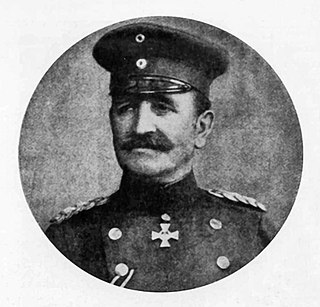
Lieutenant General Kuno Augustus Friedrich Karl Detlev Graf von Moltke, adjutant to Kaiser Wilhelm II and military commander of Berlin, was a principal in the homosexual scandal known as the Harden-Eulenburg Affair (1907) that rocked the Kaiser's entourage. Moltke was forced to leave the military service.

Karl Eduard Maria Elmendorff was a German opera conductor.

François Antoine Habeneck was a French classical violinist and conductor.
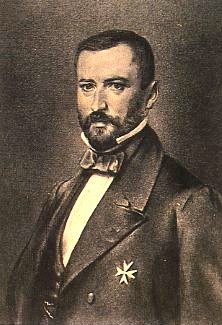
Count Friedrich Albrecht zu Eulenburg was a Prussian diplomat and politician. He led the Eulenburg Expedition and secured the Prusso-Japanese Treaty of 24 January 1861, which was similar to other unequal treaties that European powers held Eastern Countries to.

The Eulenburg expedition was a diplomatic mission conducted by Friedrich Albrecht zu Eulenburg on behalf of Prussia and the German Customs Union in 1859–1862. Its aim was to establish diplomatic and commercial relations with China, Japan and Siam.
Ernst Eulenburg the music publisher was established by Ernst Eulenburg in Leipzig in 1874. The firm started by publishing a series of studies by a Dresden piano teacher, and then expanded into light music and works for men's chorus, at first all non-copyright works.

Max Herbert Eulenberg (1876–1949), was a German poet and author born in Cologne-Mülheim, Germany. He was married from 1904 to Hedda Eulenberg.
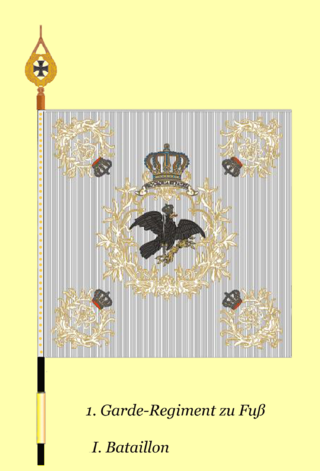
The 1st Foot Guard Regiment was an infantry regiment of the Royal Prussian Army formed in 1806 after Napoleon defeated Prussia in the Battle of Jena–Auerstedt. It was formed by combining all previous Foot Guard Regiments, especially the 6th and the 15th Infantry Regiments of the Old Prussian Army, the former were the famous Potsdam Giants of Frederick William I of Prussia, the latter was commanded and led by Frederick the Great as his life guard, and was, from its inception, the bodyguard-regiment of Kings of Prussia. Save William II, who also wore the uniforms of other regiments, all Prussian Kings and most Princes of Prussia wore the uniform of the 1st Foot Guard Regiment. All Princes of Prussia were commissioned lieutenants in the 1st Foot Guards upon their tenth birthdays. The King of Prussia was also the Colonel-in-chief of the regiment, as well as the Chief of the 1st Battalion and 1st Company of the regiment. Therefore, the regiment held the highest rank within the Prussian Army, which, among other things, meant that the officer corps of the regiment marched before the princes of the German Empire and the diplomatic corps in the traditional New Year's reception. Unofficially, the regiment was known as the "First Regiment of Christendom".
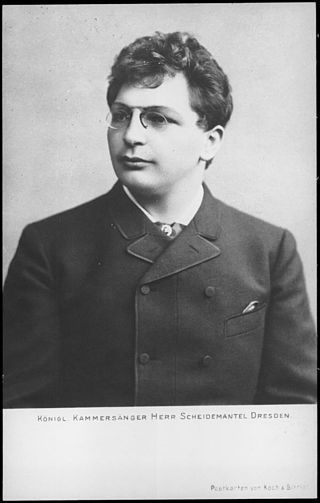
Karl Scheidemantel was a German baritone singer, and later an opera director.
Eulenburg is a German surname. Notable people with the surname include:
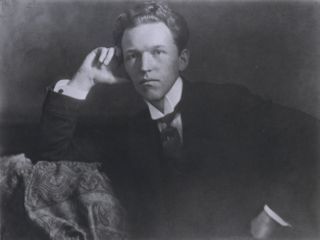
Sigwart Botho Philipp August zu Eulenburg, Count of Eulenburg was the second son of Philipp, Prince of Eulenburg (1847–1921) and his wife Augusta, born Countess of Sandels (1853–1941) and a German late romantic composer who fell in the First World War.

Friedrich-Wend, Count of Eulenburg and Hertefeld, known as Prince of Eulenburg and Hertefeld, Count of Sandels, was a German aristocratic farmer and estate owner of Liebenberg and Häsen in (Brandenburg) as well as Hertefeld and the Castle of Kolk (Niederrhein).

Germany and Thailand share bilateral relations officially dating to 1858. Thailand has an Embassy in Berlin, consulates generals in Frankfurt and Munich and Germany has an Embassy in Bangkok.
The Treaty of Amity and Commerce between the Kingdom of Prussia and the Tokugawa Shogunate (1861) opened diplomatic relations and trade between the two countries. This would come in a series of unequal treaties imposed on the Tokugawa Shogunate in its later stages.